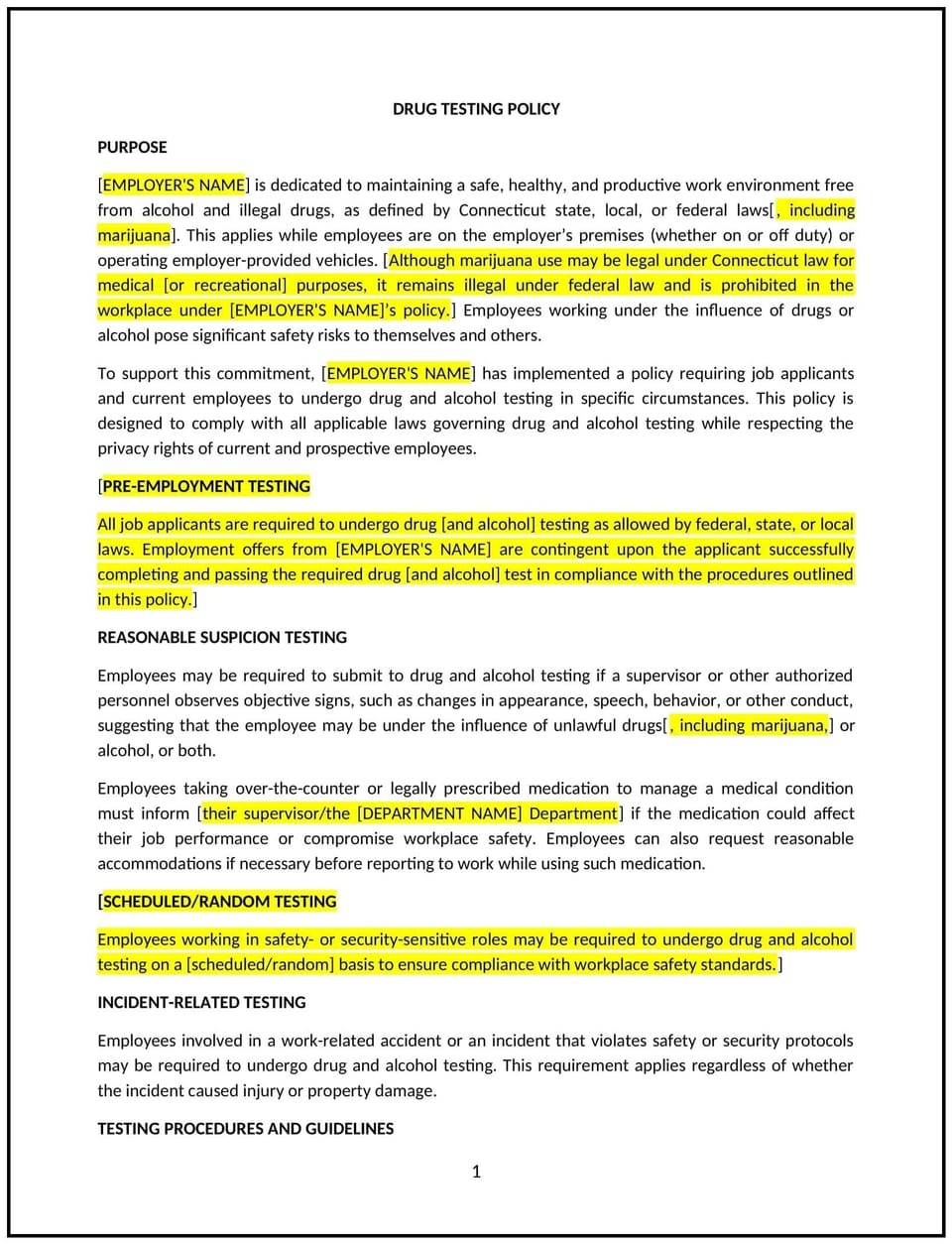Drug testing policy (Connecticut): Free template

Drug testing policy (Connecticut)
A drug testing policy helps Connecticut businesses maintain a safe, productive, and compliant work environment by establishing clear guidelines for employee drug testing. This policy outlines when and how drug testing will be conducted, the types of tests used, and the procedures for handling positive test results, ensuring compliance with both federal and state regulations.
By implementing this policy, businesses can reduce workplace accidents, improve employee performance, and ensure that employees adhere to company standards for safety and productivity.
How to use this drug testing policy (Connecticut)
- Define testing criteria: Specify when drug testing will occur, such as pre-employment, random, post-accident, or for cause (e.g., when there is reasonable suspicion of drug use).
- Outline the testing procedure: Detail the steps involved in the testing process, including the type of tests used (e.g., urine, saliva, or blood tests), the collection process, and how results will be handled.
- Address positive results: Define the steps taken if an employee tests positive for drugs, including the possibility of disciplinary action, employee assistance programs, or mandatory counseling.
- Protect confidentiality: Ensure that all test results and personal information are kept confidential and are shared only with individuals who need to know, in compliance with state and federal privacy laws.
- Ensure legal compliance: Make sure the policy complies with Connecticut state laws, the Americans with Disabilities Act (ADA), and federal regulations, including the Drug-Free Workplace Act of 1988.
Benefits of using this drug testing policy (Connecticut)
This policy offers several benefits for Connecticut businesses:
- Improves workplace safety: Helps prevent accidents or injuries related to drug use by ensuring employees are drug-free while on the job.
- Increases productivity: Promotes a productive work environment by discouraging drug use that could impair performance.
- Supports legal compliance: Ensures the business adheres to Connecticut state laws and federal regulations regarding drug testing in the workplace.
- Reduces legal risks: Mitigates the risk of liability for accidents or injuries caused by impaired employees.
- Promotes employee well-being: Provides a framework for offering support to employees who may have drug use issues, such as through counseling or treatment programs.
Tips for using this drug testing policy (Connecticut)
- Communicate clearly: Ensure that all employees are aware of the policy and understand the circumstances under which drug testing will occur, the types of tests used, and the consequences of a positive test.
- Train managers: Train managers to handle testing procedures appropriately, ensuring consistency and fairness in how the policy is applied.
- Protect employee privacy: Maintain confidentiality of test results and personal information, sharing results only with relevant personnel and in compliance with legal requirements.
- Monitor compliance: Regularly review drug testing procedures to ensure they align with Connecticut laws, federal regulations, and best practices in the workplace.
- Review periodically: Update the policy as needed to reflect changes in Connecticut state laws, federal regulations, or business practices regarding drug testing.
Q: How does this policy benefit my business?
A: The policy helps maintain a safe and productive work environment by ensuring employees are not under the influence of drugs while at work, reduces the risk of workplace accidents, and ensures legal compliance with state and federal regulations.
Q: When will drug testing be conducted?
A: Drug testing can be conducted at various stages, including pre-employment, randomly, after an accident, or when there is reasonable suspicion of drug use. The policy should outline the circumstances under which testing will occur.
Q: What happens if an employee tests positive?
A: If an employee tests positive, the policy should outline the next steps, which may include disciplinary action, referral to an Employee Assistance Program (EAP), or required counseling or treatment.
Q: How does the policy address employees with disabilities?
A: The policy should comply with the Americans with Disabilities Act (ADA) and make accommodations for employees with disabilities while ensuring that drug testing procedures are fair and consistent for all employees.
Q: How often should this policy be reviewed?
A: The policy should be reviewed annually or whenever there are updates to Connecticut laws, federal regulations, or changes in business practices to ensure it remains relevant and compliant.
This article contains general legal information and does not contain legal advice. Cobrief is not a law firm or a substitute for an attorney or law firm. The law is complex and changes often. For legal advice, please ask a lawyer.


